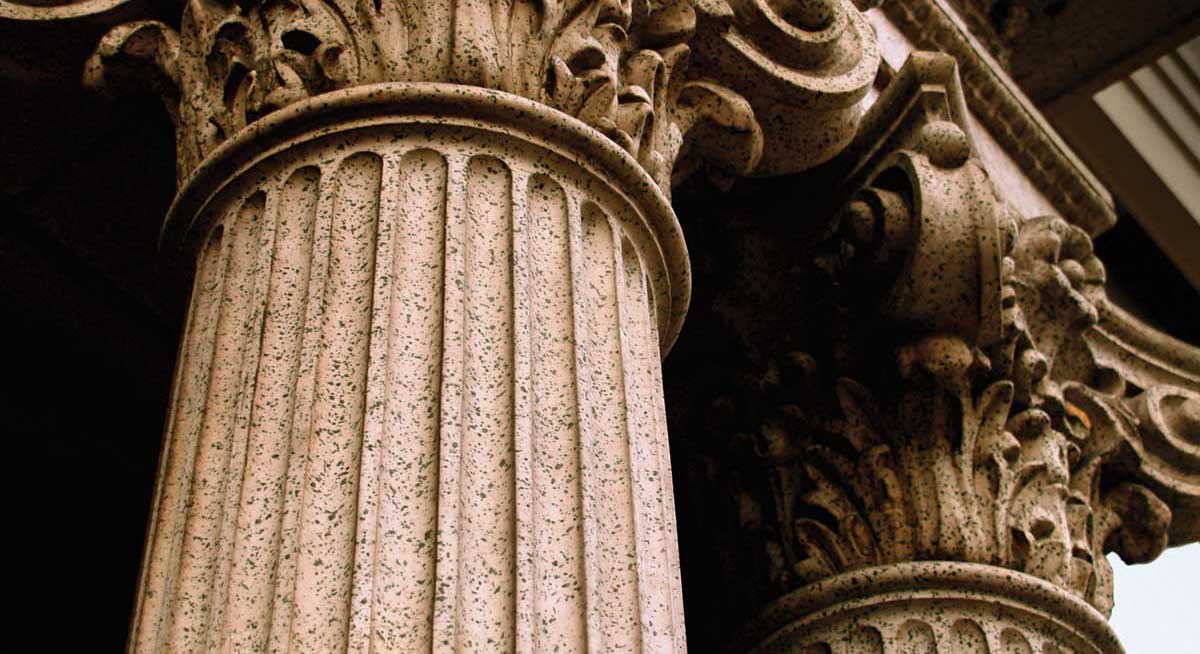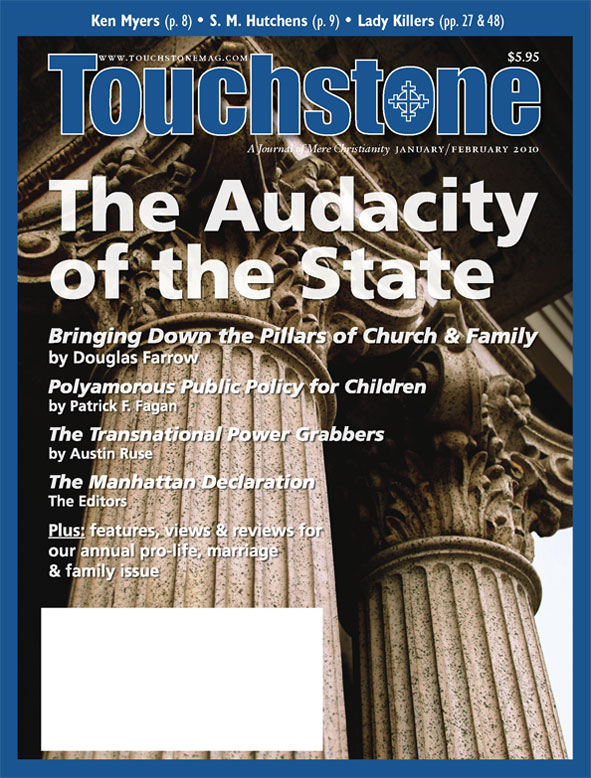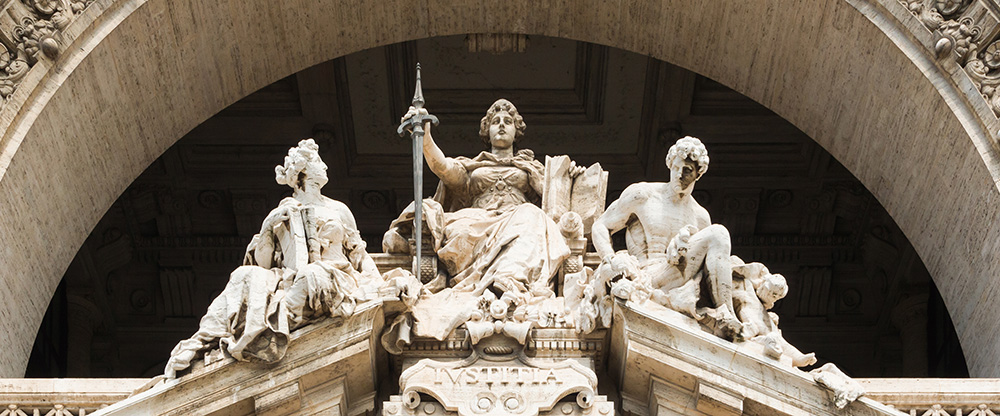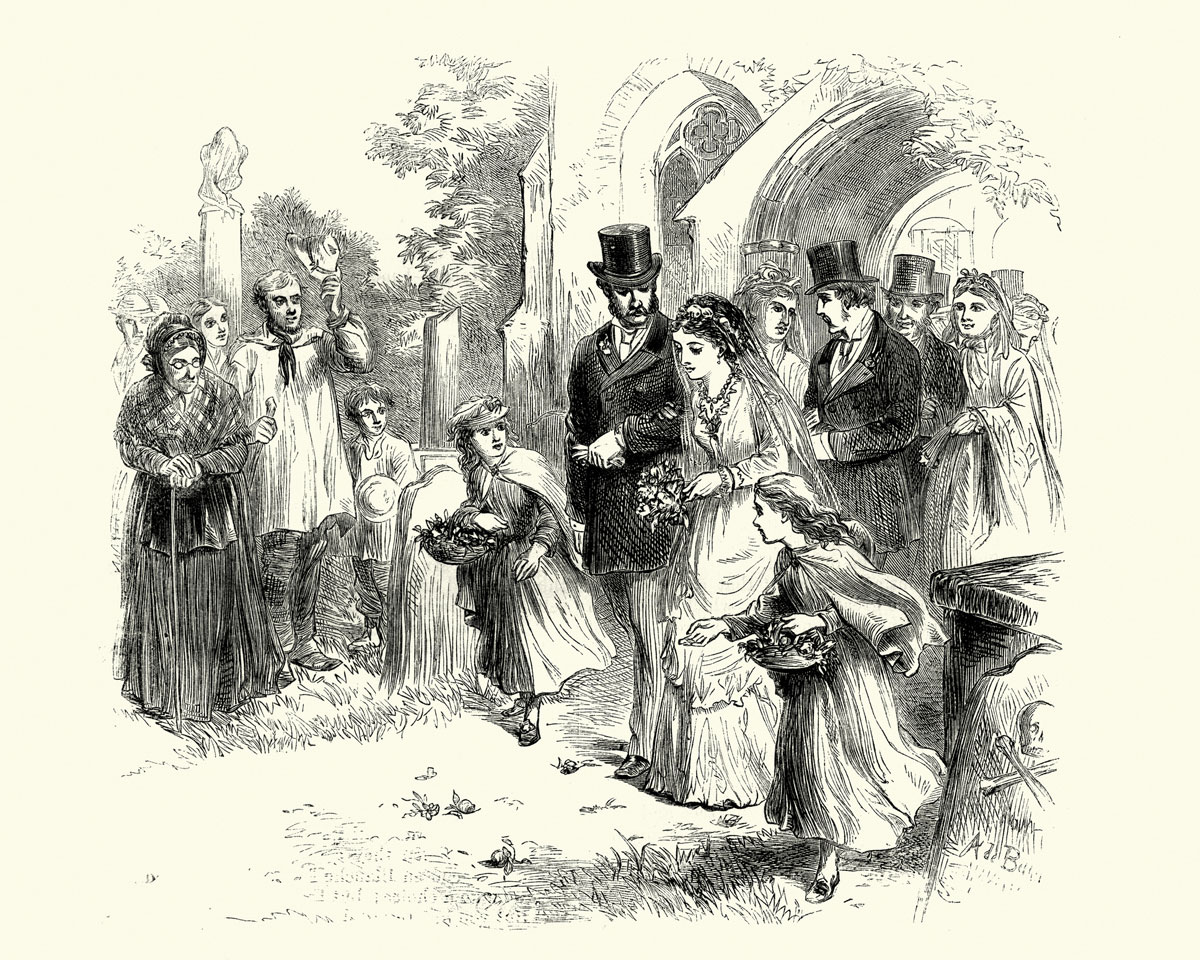Feature
The Audacity
of the State
It’s Bent on Bringing Down the House on the Family & the Church
by Douglas Farrow
Jeremiah Wright’s 1990 sermon, “The Audacity to Hope,” which lent Barack Obama the title of his electioneering book, has the story of Hannah as its text, and a painting by G. F. Watts as its foil. Whether the lecture at which Wright first heard of the painting, or his own subsequent reading, included a consultation of G. K. Chesterton’s 1904 treatment of Watts, I can’t say. But Chesterton writes of Watts as follows:
Those who know the man himself, the quaint and courtly old man who is still living down at Limnerlease, know that if he has one trait more arresting than another, it is his almost absurd humility. He even disparages his own talent that he may insist rather upon his aims. His speech and gesture are simple, his manner polite to the point of being deprecating, his soul to all appearances of almost confounding clarity and innocence. But although these appearances accurately represent the truth about him, though he is in reality modest and even fantastically modest, there is another element in him, an element which was in almost all the great men of his time, and it is something which many in these days would call a kind of splendid and inspired impudence. It is that wonderful if simple power of preaching, of claiming to be heard, of believing in an internal message and destiny: it is the audacious faculty of mounting a pulpit. [ G. F. Watts, 1904]
The Reverend Wright and President Obama certainly have the courage to mount a pulpit and preach. They, too, show a certain “inspired impudence,” albeit not of a Victorian variety. Obama’s rhetoric in particular strikes me as lacking any underlying modesty or humility. But then our present political condition is one of immodesty, not least where the state is in view, which is why I have somewhat impudently turned the title of Obama’s book back upon itself.
The Savior State
When I speak of the audacity of the state, the kind of state I have in mind is what we may call the savior state. The main characteristic of the savior state is that it presents itself as the people’s guardian, as the guarantor of the citizen’s well-being. The savior state is the paternal state, which not only sees to the security of its territory and the enforcement of its laws but also promises to feed, clothe, house, educate, monitor, medicate, and in general to care for its people. Some prefer to call it the nanny state, but that label fails to reckon with its inherently religious character. The savior state does have a religious character, precisely in its paternalism, and may even be comfortable with religious rhetoric.
We are familiar with such rhetoric from ancient times. Was Caesar not soter? Did his coinage not mark him out as divi filius and pontifex maximus? “This, this is he,” says Anchises in Virgil’s Aeneid, the one you’ve been waiting for—“the man you have heard promised to you so often, Augustus Caesar, son of a god, who will once again establish the Golden Age in Latium, in the region once ruled by Saturn.”

We are familiar with it from modern times too. The savior state is the kind of state that Hobbes envisioned, or that Louis Du Moulin had in mind when he said that “the Commonwealth is a visible church.” It is the kind of state that emerges when it is assumed, as Herbert Thorndike pointed out in objection to both “Hobbism and Independency,” that “a man may be heir to Christ’s kingdom and endowed with Christ’s Spirit without being, or before he be, a member of God’s church.” It is the kind of state that Obama had in mind when, during the presidential campaign, he invited a Christian audience in South Carolina to see him as “an instrument of God” and to help him “create a Kingdom right here on Earth.” Presumably it is the kind of state Dorothy Cotton had in mind when she penned her new gospel ditty:
Tell me, tell me, why was Obama born?
Tell me, tell me, why was Obama born?
Somebody had to inspire our youth
Somebody had to hear every voice
Somebody had to tell the truth
That’s why Obama was born, my lordy,
That’s why Obama was born.
A single verse—there are five others—suffices, I think, to make the point.
Eschatological Reserve
It is customary these days to associate the religiously audacious state with theocratic Islamic countries such as Iran, or with Christendom, and to see them as belonging to a “medieval” mindset. The savior state should not be associated with Christendom, however, but with the demise of Christendom. It is a great achievement of the Enlightenment to have taken credit for the doctrine of the separation of church and state, when in fact it effectively abolished that doctrine.
Separation of church and state was predicated on the eschatological reserve on which Christianity insisted, a reserve that required a doctrine of “the Two” and refused to combine the kingly with the priestly in a single office or person. To combine these offices (with their respective “swords”) belonged to Christ alone, and any other claimant to both was ipso facto a kind of Antichrist.
This same eschatological reserve, while supporting all manner of advances in civilizing social and political life, repudiated all utopianism, whether progressive or regressive. It sought no return to a Golden Age, nor did it trumpet “Change you can believe in.” It knew of two loves and two cities made by those loves, and it sought only peace as far as possible between them and within them.
The disruption of that peace in the so-called Wars of Religion was what inspired a revolution under the banner of political liberalism, but the Wars of Religion were not merely Wars of Religion, and political liberalism has morphed into a comprehensive liberalism that is itself religious in character. Comprehensive liberalism will not hear of Christian eschatology as a matter of public and political relevance. Indeed, it has as one of its fundamental premises that Western society has done away with Christian theology (I do not say, all theology) as a matter of public and political relevance. And so it has. But that has opened the field to would-be saviors and utopians of every stripe. It has made possible the return of the savior state—the audacious state that aims at building a kingdom of God right here on earth.
Re-Sacralized State
We can hardly be surprised at this. The Erastianism which (to speak anachronistically) had long been trying to get the upper hand in Christendom, managed to do so in the wake of the Lutheran Reformation, though it was in England that it first succeeded. The year 1534 brought the Act of Succession, and a mandatory oath of allegiance that included assent to everything declared by parliament about marriage in general and about Henry’s in particular. Later that year, the Act of Supremacy also established the king’s ecclesiastical jurisdiction, making no mention of the proviso formerly attached to it by the bishops: “as far as the law of Christ allows.”
Christendom, of course, had already seen many princes who were determined to make the church do their bidding. But Henry, by writing his supremacy into the laws of the realm, inaugurated a new era. In that era, the ongoing process of subordinating religion to the demands of the state would outrun the monarchy as such, and the Church of England too. Not merely some, but all of the church’s authority over things public would gradually be expropriated, binding even the conscience—as the Act of Succession already did—to the authority of the state.
Today we live in a society that shrinks in horror from the very idea of established religion, something the American Constitution in any case forbids. Yet we live, even if we live in America, in states increasingly ready to withdraw conscience clauses not only from public servants but also from doctors and druggists and so forth, requiring them to violate the teachings of their religion and the dictates of their consciences in order to demonstrate their allegiance to the state.
In Britain, and increasingly in North America, even churches and charitable organizations are not exempted from laws that demand conformity to state-endorsed ideologies loaded with religious implications. Penalties for violation include heavy fines or even imprisonment. Thus have we come round to accepting Erastus’s invitation to the state to punish the sins of Christians, supplanting the church’s sacramental discipline. We have come round, that is, to the de-sacralization of the church and the re-sacralization of the state, which is once again taking a tyrannical turn.
A Modern-Day Samson
Tyranny can nowhere succeed without pulling down the two most prominent pillars of political freedom, the pillars that have always provided for a roof or shield over the individual and his conscience. One pillar is the natural family unit; the other is the religious community. Of course, these pillars are not everywhere equally strong or upright. They may themselves be transformed into instruments of tyranny by this or that form of idolatry. But they are pillars for the simple reason that they do not concede to the audacious and immodest state the total authority it craves.
The natural family unit confronts the state as an entity that claims rights not granted by the state but brought to it—rights the lawful state is obliged to recognize and respect. The religious community likewise claims rights and liberties that derive from a source other than the state, a source that transcends and relativizes the state.
These two pillars are beginning to crack, however, in the grip of a modern-day Samson. I mean precisely that muscular but (if he only knew it!) blind and captive creature called “the individual.” Not the individual of whom Kierkegaard spoke when he asserted, in view of the peculiar dignity bestowed on human beings by the incarnation of God, that “one is worth more than a thousand.” But rather the individual fancied by the likes of Bentham, whose dignity consists merely in the freedom to pursue his own interests in his own way, whose interests must therefore be balanced against those of his neighbor under the formula, “Each to count for one and no more than one.”
Even this individual comes to the state with rights of his own, rights that do not derive from the state; but the state is always the arbiter of his rights. Moreover, this individual is not natural (as the “state of nature” philosophers claim) but unnatural, just because he is naked and alone, brought into the world by no one, lacking kin or allegiance, unclothed by tradition—or at all events resentful of it. With such an individual the state that has tyrannical aspirations can happily do business, for he is the individual who has been taught to see himself as chained between the two great pillars of family and church, constrained and belittled by their conventions; who in his shame and fury is willing to call, not on God, but on the power of the state as if on God, to bring them down to the dust.
More than one modern philosopher has dallied with this Samson, betraying him into the hands of the state. John Stuart Mill comes to mind as one of the most successful. Mill’s seductive side is his libertarian individualism. The sting is in the statism that ultimately overpowers it.
Liberty Prior to Truth
It is not as though no one has noticed the contradiction. William Gairdner, for one, makes much of it in The Trouble with Democracy. He observes how the first three chapters of On Liberty lay the foundations of libertarianism, the cornerstone of which is the thesis that “mankind are greater gainers by suffering each other to live as seems good to themselves, than by compelling each to live as seems good to the rest.” That thesis has as its corollary the so-called harm principle, which Mill puts as follows: “The only purpose for which power can be rightfully exercised over any member of a civilized community, against his will, is to prevent harm to others.”
To read these first three chapters is to be led out of the cave of civil coercion and social intolerance into the broad places of spontaneous experiments in individual freedom. “The only freedom which deserves the name, is that of pursuing our own good in our own way, so long as we do not attempt to deprive others of theirs, or impede their efforts to obtain it.” “No society in which these liberties are not, on the whole, respected, is free,” says Mill, “whatever may be its form of government; and none is completely free in which they do not exist absolute and unqualified.”
Gairdner has put his finger on the most seductive element in these chapters of On Liberty, which are pitched at just about the right level, intellectually and rhetorically, for crusading law clerks and higher-court justices. It lies in the notion that “liberty is prior to truth,” and indeed truth’s “efficient and final cause.” Gairdner is exactly right to put it this way. The power of On Liberty to overturn social and moral and religious conventions arises from Mill’s exciting and flattering suggestion that freedom will lead you into the truth. That iconoclastic gospel from the Romantic period still competes very successfully, tractable as it is to post-modern cynicism, with the older idol-smashing gospel of Jesus, that “the truth will set you free.”
Mill’s gospel takes no account of the creator/creature distinction, or of the fallenness of man. It takes no account of a freedom higher than freedom of choice, and gives no thought to how the truth of our own good will be recognized, or how that good will prove commensurate with the good of others. It is incurably romantic and naively optimistic. Most significantly, it fails to reckon with the fact that, in the absence of an overarching common good, based on a prior truth to which both the individual and the state are subject, the state must become the arbiter of all the competing goods of “free” individuals. It is not the individual who triumphs, then, in the appeal to a freedom that is prior to truth, but the state.
The Harm Principle
Behind Mill stands Rousseau, of course, whose rather more obvious statism Mill hoped to avoid. The basic premise of On Liberty is drawn from the Declaration of the Rights of Man and of the Citizen, that “liberty consists in being able to do anything that does not injure another.” And that dictum is in turn drawn from Rousseau, who got it from the Marquis d’Argenson, to whom we actually owe the harm principle: “In the Republic each man is perfectly free in all things that do no harm to others.” Rousseau’s intention in popularizing it was to downplay the obligations imposed by civil society, which he regarded as a corrupting more than a civilizing influence, especially in the form of family and church.
One’s primary obligations would hereafter be understood as obligations chiefly to oneself, on the one hand, and to the state on the other. That is what the harm principle is really all about—the elimination of the oppressive middle term between the individual and the state. This begs the question, however, as to what does or does not harm another, and who will decide that. Both Mill and Rousseau have ideas about that, and one gets glimpses of Mill’s ideas in the final chapters of On Liberty. Only glimpses, mind you, because Mill’s ideas aren’t really very libertarian after all.
Linda Raeder has also noted the contradiction in Mill, and her take on it is more cynical. In John Stuart Mill and the Religion of Humanity she develops Joseph Hamburger’s argument that Mill’s purpose in On Liberty was to implement the first stage of his Comtean agenda; that is, to assist in the people’s liberation from Christian religion and morals via individualist ideals, with a view to their eventual re-indoctrination in the atheistic Religion of Humanity, the religion of duty to the greater good of man. In other words, first you must make of the Christian an individual; then you must free him from his “miserable individuality” (Mill’s expression in Utilitarianism) into the new community that is the society whose ideal object is not God but itself.
Here again, Mill reminds one of Rousseau. They have in common an idea of obligation to the res publica, religiously conceived, that is a deliberate alternative to the idea of obligation to God and to the neighbor. Like Gairdner, Raeder points to the influence of Mill’s wife, the Romantic poet Harriet Taylor, on the first three chapters of On Liberty. But liberty was really for great souls like Harriet, not for the masses. The masses must “be indoctrinated from infancy in the values and ethics created by the best and wisest specimens of humanity.” They must be domesticated, in other words, by the savior state.
State Control of Education
However one reads Mill, it is safe to say that the further we have pressed his libertarian principles, the deeper we have submerged ourselves in the statist element of his thought and compromised our freedom. The sphere of education, and the related sphere of family law, have become particularly important battlegrounds.
For Mill, as for Bentham and others of their persuasion, the lack of a properly domesticated society is due (as Jacob Talmon puts it in The Rise of Totalitarian Democracy) “not to man but to the failure of governments to form man with the help of education and proper laws.” Working on the premise that “in an improving state of the human mind, the influences are constantly on the increase which tend to generate in each individual a feeling of unity with all the rest,” Mill invites us to imagine a situation in which
this feeling of unity [would] be taught as a religion, and the whole force of education, of institutions, and of opinion, directed, as it once was, in the case of religion, to make every person grow up from infancy surrounded on all sides both by the profession and by the practice of it.
Today that isn’t at all difficult to imagine.
Take Quebec, for example, where public education in North America was begun back in the 1660s by the diligent labors of the Vicar Apostolic, François de Laval, and a small band of hard-working colonists. The remarkable system they built has been almost completely colonized by the state, which has now instituted a mandatory curriculum in religion and ethics designed to instill just such a feeling in every young citizen (even those in private or religious schools, though that been challenged in the courts).
More proximate than Mill, in the inspiration of the program, is a 1996 report by the International Commission on Education for the Twenty-first Century, titled Learning: The Treasure Within, which has globalized Mill’s basic idea. “We must be guided,” says Jacques Delors in that report, “by the Utopian aim of steering the world toward greater mutual understanding, a greater sense of responsibility and greater solidarity, through acceptance of our spiritual and cultural differences.”
One should not be deceived by the reference to acceptance of differences. What this actually means in practice is increased state intervention in areas constitutionally reserved for civil society, so as to suppress or neutralize the visions children inherit from their familial and religious communities, in favor of the vision of “the best and wisest specimens of humanity” that such commissions can muster.
State Control of Children
The ascendancy of the state over civil society, which it ought rather to serve, is virtually guaranteed where the state exercises full control over education—particularly if the goal of education, as one professor boldly asserted in a recent McGill forum, is to release children from the control of their parents. In America, one notes, there have long been advocates of the still more radical idea that children should be regarded as the state’s property, to be educated on a compulsory basis according to state needs and requirements. That is a thesis likely to be advanced with renewed urgency as the implications of our declining birthrate begin to be grasped.
Nor is it altogether lacking support from the law. In 1840 Justice Paige of Connecticut opined in Mercein v. People that “the moment a child is born it owes allegiance to the government of the country of its birth, and is entitled to the protection of the government.” He further explained that “with the coming of civil society the father’s sovereign power passed to the chief or government of the nation.” While the state, for its own convenience, passes part of this power back to the parents, it maintains sovereignty over the question of what is in the best interests of the child. The Colorado Supreme Court partly endorsed that view in a 1910 child custody case:
Though nature gives to parents the right to the custody of their own children, and such right is scarcely less sacred than the right to life and liberty, and is manifested in all animal life, yet among mankind the necessity for government has forced the recognition of the rule that the perpetuity of the state is the first consideration, and parental authority itself is subordinate to this supreme power.
The pattern we have already observed is very much in evidence here. Radical critics such as John Taylor Gatto are not mistaken in pointing out the use of (basically Christian) doctrines of individual destiny, and of subjective rights, to separate children from their natural communities and attach them to artifacts of the state. In Canada we have performed costly exercises of public penance over such strategies in connection with the native residential schools, yet we are now doing something very similar with everyone but natives. The ever more vigorous expansion of public welfare programs, which we have witnessed on both sides of the border, works on exactly the same principle, of course: Citizens are separated from both their natural family units and their religious communities by a cultivated reliance on the state.
What is more, the normalization of divorce—one of the most significant features of our contraceptive culture—has ever more deeply insinuated the state into the child-rearing process and so into the sphere of the family. The “great and pernicious error” against which Pope Leo XIII warned in Rerum Novarum has thus gradually become the norm; namely, “that the civil government should at its option intrude into and exercise intimate control over the family and the household.”
Naked Before the State
To make matters very much worse, the parens patriae power has recently received an enormous boost from another feature of the contraceptive society: same-sex “marriage.” Though most people have not yet realized it, the advent of same-sex marriage has transformed marriage from a pre-political institution conferring “divine and human rights,” as the Roman jurist Modestinus put it, into a mere legal construct at the gift and disposal of the state. The legal terrain has thus changed dramatically, along with the cultural—something I have tried to show in a little book called Nation of Bastards. The family is ceasing to be what the Universal Declaration of Human Rights confesses it to be, viz., “the natural and fundamental group unit of society.”
Replaced by a kaleidoscope of transient sexual and psychological configurations, which serve chiefly to make children of adults and adults of children, the declining family is ceding enormous tracts of social and legal territory to the state. At law, parent-child relationships are losing their a priori status and privilege. Crafty fools ask foolish fools, “What harm does same-sex marriage do to your marriage, or to your family?” The truthful answer is: Same-sex marriage makes us all chattels of the state, because the state, in presuming to define the substance rather than the accidents of marriage, has made marriage itself a state artifact.
Those who have trouble connecting the dots here—which lamentably includes many defenders of the traditional institution—should take time to consider the fact that the new “inclusive” definition, in striking procreation from the purview of marriage, has left both parents and children without a lawful institution that respects and guarantees their natural rights to each other.
Opening up marriage in principle to non-generative unions really means closing it in principle to the inter-generational interests on which it has always been based. From now on, the handling of those interests will be entirely dependent, legally speaking, upon the good graces of the state. Every citizen will stand naked before the state, unclothed by his most fundamental community, unbuffered by any mediating institution with its own inherent rights. Nor should it be overlooked that, what the state has the power to define, it has the power to define again and again, and even to dispense with.
Admittedly, even the state has not yet fully connected the dots, but that is happening with remarkable rapidity, as concurrent moves in education demonstrate. States and international agencies are increasingly prone to argue that children have the right to a state-directed education and that this right must be protected by the state against the interference of parents. The logic is not difficult to follow: If marriage is procreative, it is also educative; but if it is not procreative, it is not educative either—educative rights and responsibilities are up for grabs, and it is the state that will do the grabbing. The pillar that is the family appears to have cracked nearly through.
Samson’s Revenge, or the Ichabod Effect
In a 2008 speech at the Catholic University of America, James Cardinal Stafford—who apparently does not see in Obama the humility that Chesterton saw in Watts—deployed his meditations on St. John’s Apocalypse “to strengthen the Catholic faithful . . . against the ever increasing pretensions of the state [to make] itself absolute.” Cyril of Jerusalem would have thought him wise: “If thou hast a child according to the flesh,” said Cyril, “admonish him now; if thou has begotten one through catechizing, put him also on his guard, lest he receive the false one as the true. For ‘the mystery of iniquity doth already work.’”
Had I space, I would now try to show you the way in which that mystery has also been at work in religion, producing cracks in the other pillar that holds up the roof which shields the individual from the state. That will have to await another opportunity, however, except insofar as I can hint at it by adverting again in conclusion to the story of Hannah.
I trust you know the story. Hannah meets Eli, who, sitting by the temple gate, mistakes her fervent prayer for drunkenness and rebukes her for being a base woman, only to discover that she is quite sober after all, and that she has been praying out of “great anxiety and vexation.” He blesses her. When Samuel is born as the answer to her prayers, Hannah delivers Samuel into Eli’s care in fulfillment of her vow to God.
That must have been a rather frightening prospect, given what everybody knew about the goings-on at the temple in those days. Eli’s sons, whom the text describes as “worthless men [who] had no regard for the Lord,” were the ones who had taken charge of it, and Eli apparently hadn’t the backbone necessary to bring them into line. (“They would not listen to the voice of their father,” we are told, “for it was the will of the Lord to slay them.”)
But Samuel is not corrupted by the sons of Eli, a fate from which God preserves him. Instead, he is given the unhappy burden of disclosing to Eli that his family line is about to be brought to a bitter end. That is just what happens during the rout of Israel by the Philistines. Blind old Eli, learning that both his sons and the ark of God have fallen to the Philistines, falls backwards from his seat at the gate, breaks his neck, and dies. His daughter-in-law, Phineas’s wife—who dies in childbirth on the same day—names her son Ichabod, “the Glory is not,” for the Glory, she says, “has departed from Israel.”
The Reverend Wright didn’t mention any of that in his sermon. I thought I would mention it, however, for the audacity of the savior state is rather like the audacity of Hophni and Phineas, who apparently believed that the house of God, and the people of God, were there merely for plunder. The savior state has its own aims and motivations, of course, motivations that may seem (despite the ever more frequent corruption scandals) much nobler than those of Eli’s sons. But the process is much the same, and the final outcome will also be the same, if its advance is not checked. That the state must collapse, when the pillars of family and church are gone, is the secret that the state itself does not know. This secret I call Samson’s revenge, but we may also call it the Ichabod effect.
The Hopeful Christian
Christianity is not about revenge, however, and it is certainly not about despair. It is, as Jeremiah Wright said, about hope (the title of Watt’s painting). Christians deny that the state is savior because they believe that God is savior. Their hope is not, like Mill’s, in the state; nor, like libertarians’, in themselves. Their hope, like Hannah’s, is in God.
So how shall they express their hope in God? What shall they do in the face of the audacious state, which threatens to bring them and their society to ruin?
Since I live in Québec, I will begin with Québec, where there is something Eli-like about many of our older clergy, and something Phineas and Hophni-like about certain of our civil servants, who follow a line of priests that defected from the Catholic Church during the Quiet Revolution. Which is to say, the former often content themselves with a rueful, defeated glance at the latter, while the latter proceed pretty much as if they had assumed the place of the former.
The hopeful Christian—hope being something quite different from mere optimism—will not be taken in by any of this. The Ministry of Education, though it issues documents these days that read like upside-down versions of Gravissimum educationis, is not the new regime in the house of the Lord. Moreover, Christians have undertaken no vow to deliver their children over to it, to be shaped by the state for its own ends. Rather, they have taken vows to God to see that their children are raised according to the faith. They must therefore demand of the state respect for their right to have their children eat from their own educational table. And they must be willing, like Bishop Laval and his “handful of colonists and scanty resources,” to invest what resources they have in providing such a table.
Something similar, I suspect, can be said in the land of Obama and Wright, though its history and habits are different. To be sure, there is a much stronger tradition there of resistance to the overweening state, but the forces of the state are also far greater. In America, Christians will require the courage of Dorothy Cotton’s hero, Martin Luther King, Jr., if they are to repair the pillars of freedom that have sustained such damage, and to roll back the impressive gains that have lately been made by the savior state. In America, too, the churches will need to renew their pedagogical mission and to fight for freedom of education. The natural family will need somehow to reclaim, if it can, the rights it is losing.
And in both countries, men and women will need to rediscover Hannah’s hunger for progeny, for the contraceptive mentality and the practice of abortion contribute very directly to the Ichabod effect.
Inspired Impudence
The hopeful Christian will not give up on any of this. But there is something else to be said. The cracks that have appeared in the pillar that is the family appeared first in the pillar that is religion. For, in Christianity, religion is still more fundamental than the family, as Jesus made clear. “He who loves father or mother more than me is not worthy of me.” The Christian religion is decidedly not an individualistic religion, however. Rather, it is an ecclesial religion that sacramentally embraces and transcends the family. That, alas, was obscured by the sectarianism into which it degenerated in the wake of the Protestant Reformation—the very same sectarianism that revived the beast that is the audacious state.
The hopeful Christian, then, if his hope is not misplaced, will eschew both individualism and sectarianism, seeking the union and communion of the Church. Like Hannah, who gave up her only son to serve the people of God in the temple of God, he will seek always the good of the Church, the precariousness of the times notwithstanding. If he acts with “inspired impudence,” it will be an inspired impudence that begins in prayer at the temple gate. That is where Hannah began, and it is where we, too, should begin. And if we, who are sober, are thought drunk and disorderly by the state and our fellow-citizens, or even by some of our priests, so be it.
Douglas Farrow is Professor of Theology and Ethics at McGill University in Montreal. His recent books include Ascension Theology, Desiring a Better Country, Theological Negotiations, and 1 & 2 Thessalonians in the Brazos Theological Commentary on the Bible. He is a senior editor of Touchstone.
subscription options
Order
Print/Online Subscription

Get six issues (one year) of Touchstone PLUS full online access including pdf downloads for only $39.95. That's only $3.34 per month!
Order
Online Only
Subscription

Get a one-year full-access subscription to the Touchstone online archives for only $19.95. That's only $1.66 per month!
bulk subscriptions
Order Touchstone subscriptions in bulk and save $10 per sub! Each subscription includes 6 issues of Touchstone plus full online access to touchstonemag.com—including archives, videos, and pdf downloads of recent issues for only $29.95 each! Great for churches or study groups.
Transactions will be processed on a secure server.
more on family from the online archives
more from the online archives
calling all readers
Please Donate
"There are magazines worth reading but few worth saving . . . Touchstone is just such a magazine."
—Alice von Hildebrand
"Here we do not concede one square millimeter of territory to falsehood, folly, contemporary sentimentality, or fashion. We speak the truth, and let God be our judge. . . . Touchstone is the one committedly Christian conservative journal."
—Anthony Esolen, Touchstone senior editor













